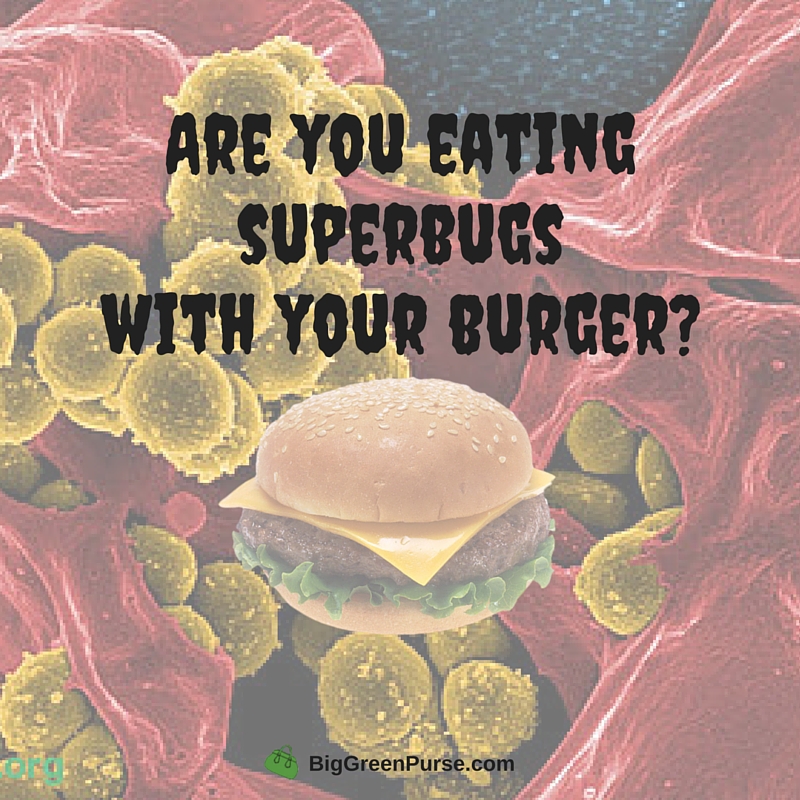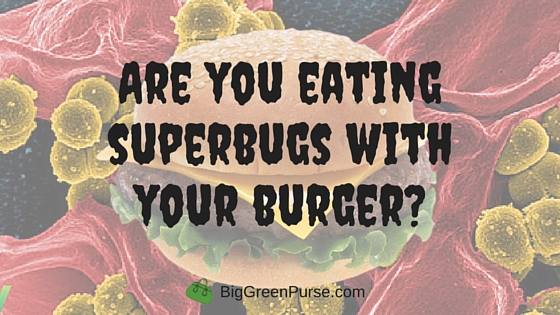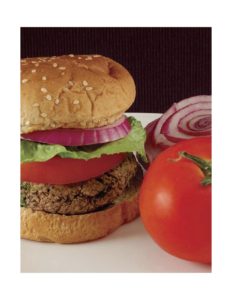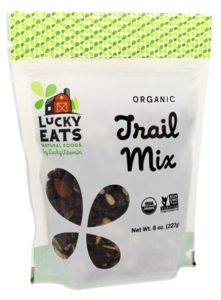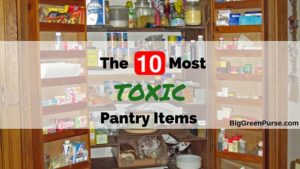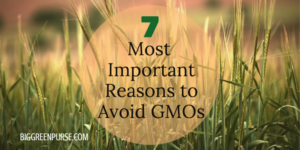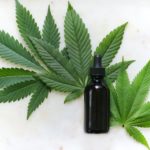“Superbugs” are not creepy crawly insects. They are bacterial organisms that can make you very sick. They’re called “superbugs” because they can’t easily be controlled with medicine. I’m pretty sure you don’t want to be eating superbugs with your burger!
According to research conducted by Consumer Reports, superbugs are proliferating in conventionally-produced ground beef. If that’s what you buy when you make a burger or other food with hamburger (like meat loaf or spaghetti sauce), you run the risk of getting so sick you could die.
That’s especially true if you like your burgers rare or medium-rare, and only cook them to an internal temperature of 160 degrees F.
Consumer Reports tested the equivalent of 1,832 quarter-pounders, bought from 103 grocery, big-box and natural food stores in 26 cities across the U.S.
What they found is stunning: five types of bacteria: clostridium perfringens, E. coli, enterococcus, salmonella and staphylococcus aureus.
All of these bacteria can cause food poisoning.
 But you should be concerned about more than an uncomfortable stomach ache.
But you should be concerned about more than an uncomfortable stomach ache.
One strain of E. coli can release a toxin that damages the lining of the intestine, often leading to abdominal cramps, bloody diarrhea, vomiting and in some cases, life-threatening kidney damage.
Between 2003 and 2012, there were almost 80 outbreaks of E. coli O157 due to tainted beef, sickening 1,144 people, putting 316 in the hospital and killing five, Consumer Reports’ analysis found.
“Ground beef was the source of the majority of those outbreaks,” said the non-profit research group.
⇒ And here’s the kicker.
“For every case of E. coli O157 that we hear about, we estimate that another 26 cases actually occur,” say the report’s authors.
Beef is the fourth most common cause of salmonella outbreaks—
one of the most common foodborne illnesses in the U.S.
For each reported illness caused by that bacteria, an estimated 29 other people are infected.
How Did Superbugs get So Super?
√ One reason the illnesses occur is because people are eating beef that they don’t cook well enough.
√ But the bigger problem is with the beef itself. Most beef is produced in “conventional” factory farm-type feedlots where the cattle are fattened up with grain and soy and fed antibiotics and other drugs to promote growth and prevent disease.
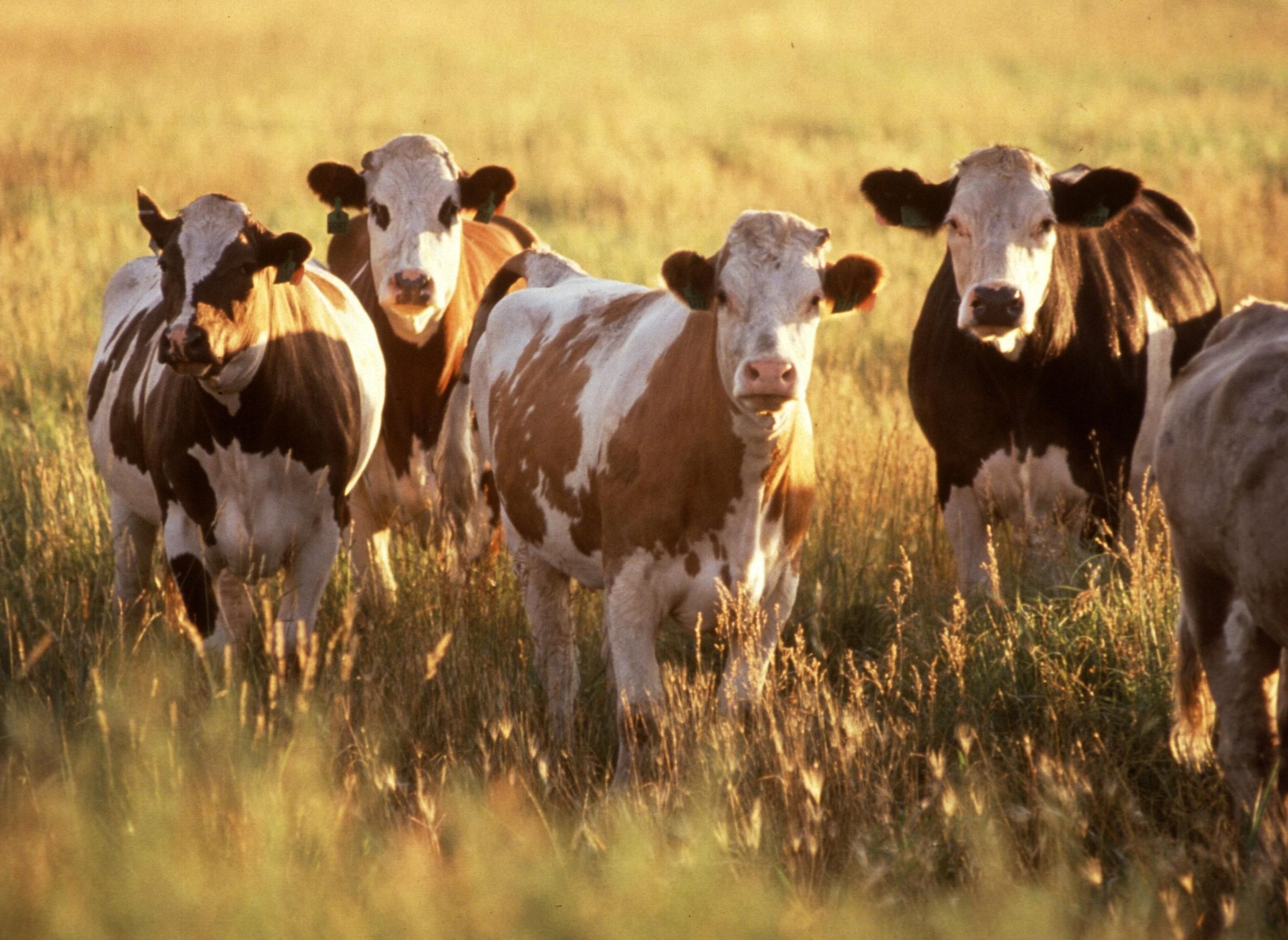 √ Ironically, these antibiotics encourage the bacteria that cause disease to develop a resistance to them.
√ Ironically, these antibiotics encourage the bacteria that cause disease to develop a resistance to them.
√ The more antibiotics cattle are given, the more resistant to them the bacteria become, which is how they turn into superbugs.
Consumer Reports found a type of antibiotic-resistant S. aureus bacteria called MRSA (methicillin-resistant staphylococcus aureus) on three conventional samples (and none on samples from cows raised in a more humane and sustainable way). S. aureus kills about 11,000 people in the U.S. every year.
√ Bacteria can also get on the meat during slaughter or processing.
With a steak or a roast, the bacteria tend to stay on the surface, so when you cook them, the outside is likely to get hot enough to kill any bugs.
But grinding up the beef mixes the bacteria throughout, contaminating all of the meat inside and out.
√ The problem is compounded because the meat and fat that are ground into beef usually come from several animals. Even if only one cow is contaminated, its meat may get mixed into many other packages.
√ Superbug-infested meat can also contaminate the processing plants that package it, as well as the stores and restaurants that serve it.
Superbugs in Your Kitchen
 Your kitchen is at risk, too. If you knead ground beef into hamburger patties or a meat loaf, you could be spreading dangerous bacteria on your counter or in your sink.
Your kitchen is at risk, too. If you knead ground beef into hamburger patties or a meat loaf, you could be spreading dangerous bacteria on your counter or in your sink.
And if you don’t scrub your hands after working with the meat, you could spread the bacteria to whatever you touch next.
“There’s no way to tell by looking at a package of meat or smelling it whether it has harmful bacteria or not,” warns Urvashi Rangan, Ph.D., executive director of the Center for Food Safety and Sustainability at Consumer Reports.
“You have to be on guard every time.”
How to Avoid Eating Superbugs With Your Burger
Eat organic meat. If you do want to eat ground beef, make sure it has come from cattle that have been raised organically and on pastures, as opposed to factory farms (which rules out most fast food restaurants and restaurant chains). As a general rule, animals raised organically will not be given growth hormones or antibiotics. As a result, they are half as likely to produce superbugs as cattle that are conventionally raised. Don’t Miss: The Case for Sustainable Meat, Poultry and Seafood Eat meat free of hormones and antibiotics. Some cattle producers, while not raising their animals organically, claim that they don’t use hormones and antibiotics. Validate their claims here before buying; if they turn out to be true, they’re a good alternative if you don’t have access to certified organic beef. Cook ground beef well. If you’re making burgers, cook them until they are well-done, not rare or medium rare. The same goes for meat balls, meat loaf and meat sauces. Keep it clean. When cooking with any meat, avoid contaminating yourself or your kitchen. Prepare meat in a large bowl or on a cutting board that can contain the meat and then be washed in hot soapy water. Protect yourself. Wear an apron you can remove when you’re finished working with the meat. Scrub your hands and nails in hot soapy water when you’re finished, as well. Watch what you eat! Remember – don’t eat rare beef.
Want to take a break from eating so much meat?
Check out our Meatless Monday recipes. They’re delish!
This recipe for a Zucchini Frittata is one of my favorites.


